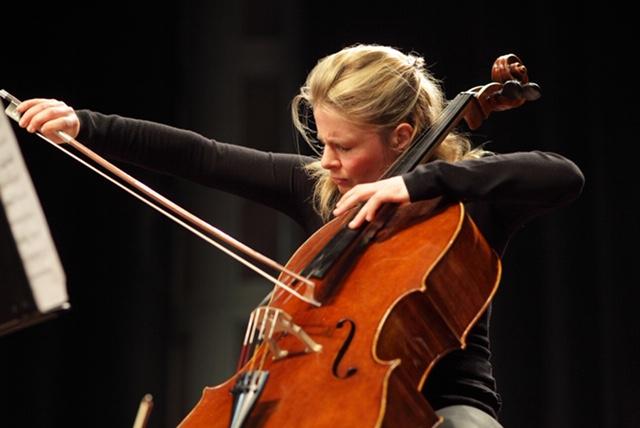The two concluding pillars of Johannes Brahms' magnificent orchestral output will form the respective halves of the Royal Bangkok Symphony Orchestra's upcoming concert at the Thailand Cultural Centre on Friday, conducted by their current music director Michel Tilkin. The Double Concerto For Violin And Cello In A Minor Opus 102 was the great composer's final orchestral statement, written especially for his maturing colleagues Joseph Joachim (violin) and Robert Hausmann (cello). At this concert, it will be performed by two fresh young female talents of the modern string playing world.
Singaporean violinist Ning Kam and German cellist Judith Ermert are already successful musicians in their own right. However, they remain at that crucial career juncture where artistic hunger and determination drives them on in the increasingly competitive arena of international soloists. They have just the right combined qualities to bring out all of the passion in this exceptionally imposing score. Not only is it technically challenging, but the interpretative side of this dense piece demands high levels of concentration and commitment from the performers. It is a work of wondrous melodic invention, carried by a structure of epic proportions. Brahms chose to use an emphatic voicing of the notes A-E-F, a permutation of Joachim's famous F-A-E signature motif ("Frei Aber Einsam", which translates as "free but lonely").
Joachim and Hausmann played the 1887 premiere, with Brahms conducting, and several more performances that season. The composer gave the manuscript to Joachim, with the inscription: "To him for whom it was written." Surprisingly, the concerto was not well received at first. Brahms' lifelong personal and artistic confidante Clara Schumann said it was "not brilliant for the instruments". The composer had sketched a second similar concerto, but abandoned this in the wake of this cold reception.
Before long, however, critics warmed to Opus 102, and future generations of A-list violin/cello partnerships had no hesitation in recording what is now recognised as a masterpiece. Musicologist Donald Tovey praised its "vast and sweeping humour". It requires two brilliant, equally matched soloists, and the Bangkok concert has that criteria met with Ning Kam and Judith Ermert.
A 2nd Prize and Audience Prize winner at the 2001 Queen Elisabeth International Violin Competition, Ning was praised by Belgium's De Standaard as "manifestly the best violinist of the competition". She plays on the rarest of precious instruments: a 1668 Nicolas Amati, on generous loan from the Rin Collection, Singapore, with which she has captivated audiences, critics and fellow musicians the world over. Her mentor Yehudi Menuhin spoke of her qualities in glowing terms: "Ning's beautiful playing testifies to her brilliance, lovely sound and intelligence."

Violinist Ning Kam.
Meanwhile, Ermert is no stranger to Thailand, nor indeed the RBSO and maestro Tilkin. In 2010, she performed the Schumann Cello Concerto here, which was a resounding success. The Bangkok Post highlighted her "extraordinary musical and technical talent". At the age of 26, Ermert was appointed solo cellist of the Brussels Philharmonic, and a year later became professor at the Royal Conservatory of Gent, where she teaches students from all over the world. Ermert plays a modern cello made by Andrew Finnigan and Pia Klaembt of Bremen.
In 1870, during a visit to Karlsruhe, Johannes Brahms infamously declared: "I will never compose a symphony!" He had by that point been wrestling with his first symphony for 15 years. Symphony No.1 In C Minor eventually materialised in 1876, a full 21 years after he began composing it. There has never been, before or since, an extended gestation period quite as protracted as this in the history of music's greatest creations. A century before, Handel had completed Messiah in just two weeks!
But Symphony No.1 In C Minor was well worth the wait. Already into his fifth decade, the brilliant pianist from Hamburg had long been acknowledged as the natural successor to Beethoven. But in order to fulfil his destiny, it was imperative that Brahms finally live up to that symphonic legacy. And so with rock solid groundwork, gritty determination and sheer force of will, he eventually perfected this masterwork. Thereafter, the process of symphonic composition came far more easily to Brahms, culminating ultimately with the Double Concerto. Not long before this of course, in 1885, came his final Symphony No.4 In E Minor. One of the most satisfying essays in any orchestra's library, it promises to be a genuine treat to enjoy the RBSO exploring this with Tilkin.
"Monumental Brahms" takes place on Friday, 8pm, at Thailand Cultural Centre, Main Hall. Tickets are 400, 800 1,200, 1,600 and 2,000 baht, available via thaiticketmajor.com.

